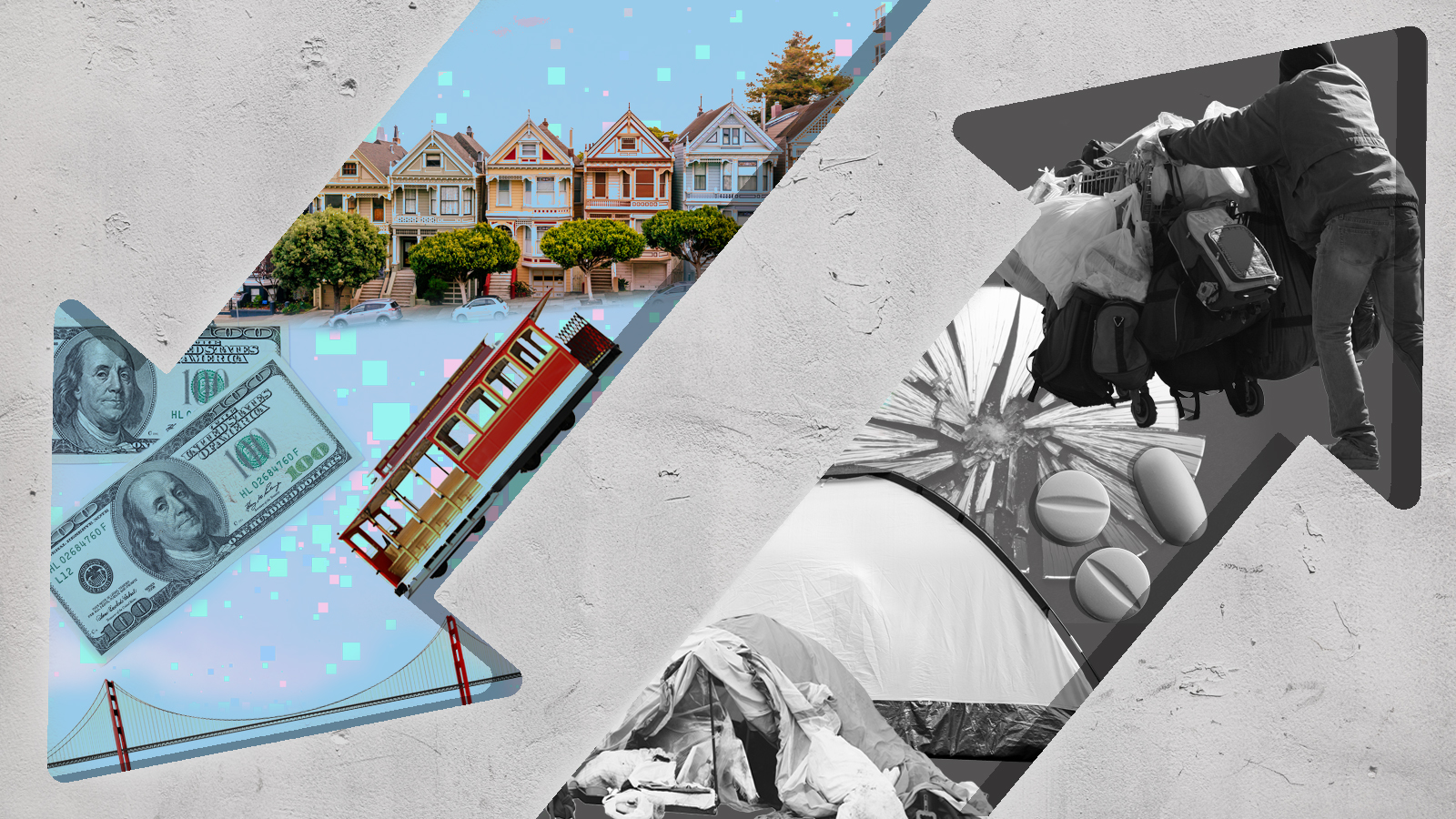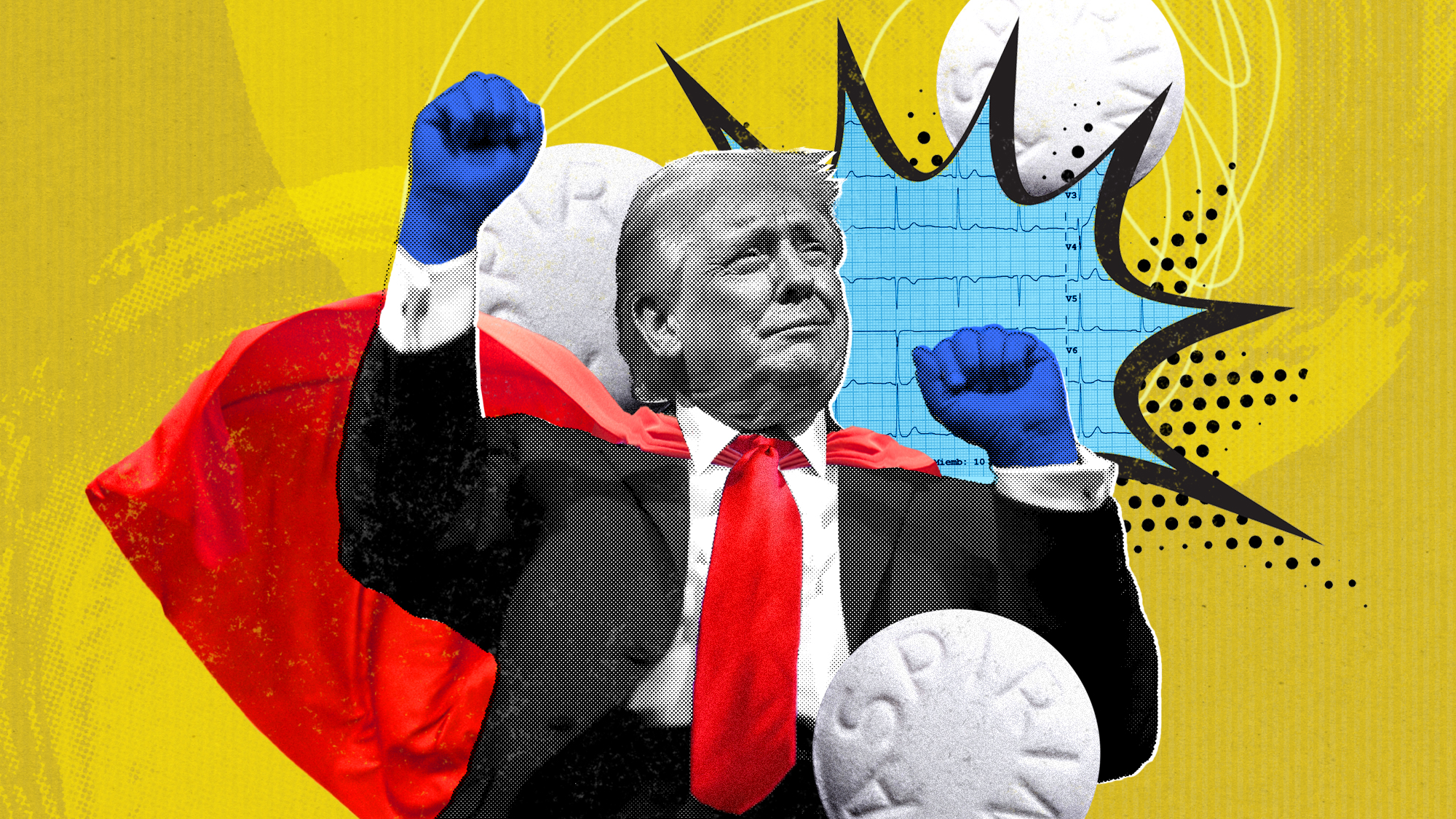From boomtown to bust, the story of San Francisco
A variety of social problems have cast a shadow over the once-gleaming City by the Bay


A free daily email with the biggest news stories of the day – and the best features from TheWeek.com
You are now subscribed
Your newsletter sign-up was successful
San Francisco is a city of two realities. The Bay Area is arguably the tech capital of the world, and the Silicon Valley region has "both the largest tech talent pool and the highest number of tech roles of any U.S. market," according to TheRealDeal. San Francisco also remains a global leader in arts, culture and education, with its greater metropolitan area containing colleges like Stanford and UC Berkeley.
It's also among the wealthiest cities in the world. It has more than 285,000 millionaires, per a 2023 report from Henley and Partners, and also has 63 billionaires — more than any other city on the planet. The Bay Area is also known for its high cost of living and consistently ranks among the 10 most expensive cities in the world, according to The Economist Intelligence Unit. Data released at the end of 2022 showed that San Francisco's "housing costs were 113% higher and utility costs were 67.5% higher … than the national average," SFGate reported. The average rent for a one-bedroom apartment in San Francisco is $3,000, among the highest in the country, according to Zumper.
Heading into downtown, though, displays a much less glamorous version of the city. San Francisco has been grappling with several societal ills for years, including a widespread drug addiction crisis. In 2019, the city had "more drug addicts than it [had] students enrolled in its public high schools," the San Francisco Chronicle reported, by a margin of more than 8,000 people.
The Week
Escape your echo chamber. Get the facts behind the news, plus analysis from multiple perspectives.

Sign up for The Week's Free Newsletters
From our morning news briefing to a weekly Good News Newsletter, get the best of The Week delivered directly to your inbox.
From our morning news briefing to a weekly Good News Newsletter, get the best of The Week delivered directly to your inbox.
While the city's rate of violent crime is lower than the national average, San Francisco has high rates of property crimes like theft and burglary. Combined with the ongoing drug crisis, this has led to a large homeless population in the city. A mid-2022 report showed that 20,000 people were expected to experience homelessness in San Francisco that year, per the San Francisco Chronicle, and "for every one person housed by a city program, four more will become unhoused."
But San Francisco has had a long history of ups and downs. So how did the Bay Area get here, and is there still a way for the city to recover? Or is San Francisco destined for failure?
Why is it an epicenter of drugs and homelessness?
The influx of fentanyl is causing many of the problems, just as it is in cities across the United States. The drug has become almost ubiquitous in San Francisco. This past June, the California Highway Patrol "seized enough fentanyl in San Francisco to potentially kill over 2.1 million people," according to the Office of the Governor. Given the city's population of just over 800,000, this would be enough to kill everyone in San Francisco nearly three times over.
At least 268 people in San Francisco died from fentanyl overdoses in the first four months of 2023, per the city's chief medical examiner. Many additional overdose deaths were attributed to heroin, methamphetamines, medicinal opioids and cocaine.
A free daily email with the biggest news stories of the day – and the best features from TheWeek.com
As a result of this fentanyl surge, users smoking drugs in public has become a common sight. However, unlike many other major cities, San Francisco "largely does not prosecute public drug use," The San Francisco Standard reported. While drug possession remains a misdemeanor crime, experts told the Standard that the city's "harm reduction" approach was the "result of a growing sentiment that … the government should take a public health approach that focuses on mitigating the harmful consequences of drug use."
These drug issues have contributed to the city's growing homelessness epidemic. California itself is home to half of the American homeless population, per McKinsey and Company, and "on any given night, 38,000 individuals in the Bay Area are homeless." Drugs don't appear to be the root cause of the city's homelessness, though. A recent comprehensive study by ASR on the matter found that the problem was the result of a "severe shortage in affordable housing, a widening gap between rising housing costs and stagnant wages, and an insufficient safety net for individuals with disabling conditions."
While 12% of respondents to the study said drug and alcohol abuse was the cause of their homelessness, this was only the third-most cited reason. Fourteen percent reported eviction as the culprit, and another 21% — more than a fifth of respondents — said they were homeless because they lost their jobs.
What role does wealth disparity play?
Not only is the cost of living increasing in the city, but the gap is widening, which researchers say is significantly contributing to the overall rise in poverty. If Silicon Valley were its own nation, it would be a "politically unstable country with extreme wealth inequalities," according to a 2023 study from San Jose State University. The study added that "African American, Latinx, Indigenous and various Asian American communities continue to receive considerably less of the economic, political, education and social rewards" afforded to other races in San Francisco.
A poll from the Chronicle found that even the city's wealthiest individuals feel the gap between rich and poor is a major problem. Among 1,653 people sampled, 75% of those who made over $200,000 per year said the wealth gap was a "problem that should be made smaller." Those who made between $50,000 and $100,000 were the likeliest to believe that the wealth gap was a problem, at 80%.
This is a notable statistic because these are people "who traditionally would have been able to afford homes but are not able to because of the city's high cost of living," Jacob Denney, of the San Francisco Planning and Urban Research Association, told the Chronicle. "People who are making $53,000 a year effectively are barely able to survive here," Denney concluded.
How can the city's problems be fixed?
One solution: Build homes. "Build lots of homes everywhere in the Bay Area. Fill in all the empty lots and surface parking with places to live. Convert commercial buildings to residential ones," Adam Rogers wrote for Insider. This could potentially be compounded by unused office space scattered throughout downtown post-Covid.
While the city is already working on these initiatives, Rogers argued against zoning laws that prevent homeless people from being housed. "Fix the zoning issues that privilege big single-family homes and make multiplexes illegal. Get rid of rules that require every living unit to include parking for cars. Turn first floors into small retail spaces that local businesses can afford," he said.
And despite cooled-off criminalization against drug addicts, police have begun arresting open-air users. While this has been panned by some critics as the "wrong approach to deal with addiction and could even increase overdose deaths," CBS News reported, the user's risk "depends entirely on what you do after the arrest," Stanford addiction researcher Keith Humphreys told the outlet. He added that these arrests should be coupled with "immediate enrollment in good medication" so people don't suffer from withdrawals.
While San Francisco undoubtedly has its downfalls, "its problems aren't all that different from other major metros," Vox reported. Rather, the city has received large amounts of negative press coverage because it "occupies a unique space in the identity of the U.S."
"San Francisco's always had this mythology of being this future-forward, progressive city," Aliyah Salahuddin, a Standford historian, told Vox. "But the rights of the disenfranchised have historically always been undercut and challenged."
Justin Klawans has worked as a staff writer at The Week since 2022. He began his career covering local news before joining Newsweek as a breaking news reporter, where he wrote about politics, national and global affairs, business, crime, sports, film, television and other news. Justin has also freelanced for outlets including Collider and United Press International.
-
 How to Get to Heaven from Belfast: a ‘highly entertaining ride’
How to Get to Heaven from Belfast: a ‘highly entertaining ride’The Week Recommends Mystery-comedy from the creator of Derry Girls should be ‘your new binge-watch’
-
 The 8 best TV shows of the 1960s
The 8 best TV shows of the 1960sThe standout shows of this decade take viewers from outer space to the Wild West
-
 Microdramas are booming
Microdramas are boomingUnder the radar Scroll to watch a whole movie
-
 A running list of everything Donald Trump’s administration, including the president, has said about his health
A running list of everything Donald Trump’s administration, including the president, has said about his healthIn Depth Some in the White House have claimed Trump has near-superhuman abilities
-
 ‘One day fentanyl will come back — and there will be little anyone can do’
‘One day fentanyl will come back — and there will be little anyone can do’Instant Opinion Opinion, comment and editorials of the day
-
 San Francisco tackles affordability problems with free child care
San Francisco tackles affordability problems with free child careThe Explainer The free child care will be offered to thousands of families in the city
-
 A running list of everything Trump has named or renamed after himself
A running list of everything Trump has named or renamed after himselfIn Depth The Kennedy Center is the latest thing to be slapped with Trump’s name
-
 A running list of the international figures Donald Trump has pardoned
A running list of the international figures Donald Trump has pardonedin depth The president has grown bolder in flexing executive clemency powers beyond national borders
-
 A running list of US interventions in Latin America and the Caribbean after World War II
A running list of US interventions in Latin America and the Caribbean after World War IIin depth Nicolás Maduro isn’t the first regional leader to be toppled directly or indirectly by the US
-
 A running list of the US government figures Donald Trump has pardoned
A running list of the US government figures Donald Trump has pardonedin depth Clearing the slate for his favorite elected officials
-
 Trump says US ‘in charge’ of Venezuela after Maduro grab
Trump says US ‘in charge’ of Venezuela after Maduro grabSpeed Read The American president claims the US will ‘run’ Venezuela for an unspecified amount of time, contradicting a statement from Secretary of State Marco Rubio
